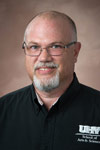From the basement of the UCLA library 62 years ago, Ray Bradbury wrote a science fiction novel expressing concerns about the limitation of free speech, the dangers of mass media and the death of literature.
Many themes present in “Fahrenheit 451” are still pertinent in today’s world. That’s why the University of Houston-Victoria is going back to the future by selecting Bradbury’s 1953 classic as the fall Community of Readers book.
Although set in the future, Bradbury was responding to the 1953 world when he wrote the book, said Jeffrey Sartain, a UHV assistant professor of English.
“What makes this book remarkable is how much Bradbury’s response to the time period has persevered as a contemporary response to our own time period,” Sartain said. “He had a wonderful ability as a writer to see the landscape and extrapolate into the future. The job of all good science fiction writers is to meditate on the present through the lens of the future.”
 |
| Jeffrey Sartain |
The Community of Readers program is designed to establish a common reading experience between first-year students and the larger community. Everyone is asked to read a book that can provide cross-disciplinary perspectives, generate discussion and foster the exchange of diverse ideas. Lessons from the book are incorporated into class lectures and projects. Book-themed events and presentations are planned for students and community members during the fall semester.
Every year, the Community of Readers Committee reviews books recommend by UHV faculty, staff and community members. After discussing those submissions, the committee narrowed down the list of possibilities to nine books, said Amanda Breu, committee chair and instruction and outreach librarian at the Victoria College/UHV Library. Each committee member read all nine books before deciding on “Fahrenheit 451.”
All UHV freshmen will receive a free copy of the book as part of the First-Year Academic Experience. The fact the book was published before most of the freshmen’s parents were born drew some debate at committee meetings. However, the book still sells about 50,000 copies a year and is an example to readers and writers living under repressive regimes.
“While the details didn’t hold up, the concepts did,” said J. Keith Akins, director of the First-Year Academic Experience. “Even though the Cold War is long gone, we are living in a world where there are nations that control everything. In this era, every electronic communication might be monitored.”
The book looks at life under an oppressive government and people who resist. Akins said it’s particularly timely for UHV students to read because they have grown up under the Patriot Act. Portions of the Patriot Act expired Sunday but were revamped and renewed Tuesday by the U.S. Senate and signed into law by the president.
 |
| Keith Akins |
“We live in what should be the least oppressed society in the world,” Akins said. “With the ongoing wars and the Patriot Act, we as a society are constantly struggling over the conflict between freedom and security. How much security should we give up to maintain our freedom and how much freedom should we give up to maintain security? These are issues critical for our students to think about as they prepare to go into the world.”
In the book, Guy Montag is a fireman. In his world, where TV rules and literature is on the brink of extinction, firemen start fires rather than put them out. His job is to destroy the most illegal of commodities, the printed book, along with the houses in which they are hidden.
Montag never questions the destruction and ruin his actions produce, returning each day to his bland life. But then he meets an eccentric young neighbor, Clarisse, who introduces him to a past where people didn’t live in fear and to a present where they see the world through the ideas in books.
“With school turning out more runners, jumpers, racers, tinkerers, grabbers, snatchers, fliers, and swimmers instead of examiners, critics, knowers, and imaginative creators, the word ‘intellectual,’ of course, became the swear word it deserved to be,” Bradbury wrote in the novel.
Akins said the book’s topics include psychology, political science, English, language arts and a term called retro futurism, which examines how people in the past expected the future to turn out. A faculty lecture series and book-related events this fall will look at those disciplines and many related topics. Since “Fahrenheit 451” still shows up on the list of challenged and banned books, the library will include it as part of its Banned Book Week Sept. 27 to Oct. 3.
Sartain said it’s likely some incoming freshmen will have read the book, but through the First-Year Academic Experience, lectures and events, the book will be unpacked at a level they haven’t experienced.
“A book this rich is going to have a lot of ways for the faculty to approach it,” he said.
Freshmen will get their copy of “Fahrenheit 451” at the beginning of the fall semester, and other UHV students, faculty and staff can request a free copy by going to the Request a Book link on the Community of Readers website, www.uhv.edu/community-of-readers/. Books will be delivered in early fall.
“Fahrenheit 451” also is available for purchase at local and online retail outlets, and copies can be checked out from the Victoria Public Library and the VC/UHV Library.